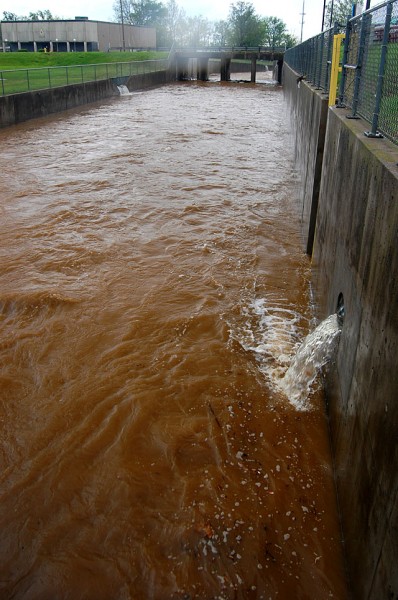 I’ve seen some scary winds, torrential rains and high waters living in Florida and covering hurricanes, but I don’t think I’ve seen such continuous rains and bad weather as Southeast Missouri has had in the last week.
I’ve seen some scary winds, torrential rains and high waters living in Florida and covering hurricanes, but I don’t think I’ve seen such continuous rains and bad weather as Southeast Missouri has had in the last week.
I wrote about our encounter with hail. Thunderstorms in Florida pop up every summer afternoon, dump a huge amount of water in a very localized area for a short period of time. It’s not unusual for it to be pouring on one side of the street and dry on the other.
Frog-strangling rain and flood control
What’s been going on in this area is days of steady to frog-strangling rain that just keeps training over us. All of that water has to go somewhere. By the mid-1980s, after a series of disastrous floods that put the Town Plaza and other shopping areas underwater, money was appropriated for a flood control project to handle runoff.
This concrete channel paralleling Kingshighway was part of it. The view above is looking south from old Kingsway toward Broadway. The Masonic Temple is at top left.
Easter in Dutchtown
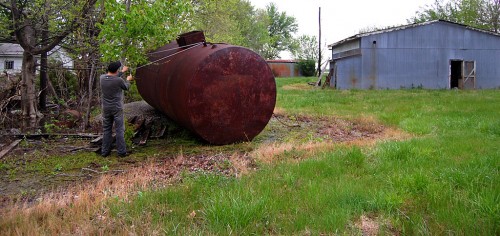 The Diversion Channel is running full and the Mississippi River is projected to hit 44.5 feet later in the week. As I’ve mentioned before, we have property in Dutchtown that floods at 39 feet on the Cape gauge. I’ve published photos of what we looked like in 1993, when the water reached 48.49 feet.
The Diversion Channel is running full and the Mississippi River is projected to hit 44.5 feet later in the week. As I’ve mentioned before, we have property in Dutchtown that floods at 39 feet on the Cape gauge. I’ve published photos of what we looked like in 1993, when the water reached 48.49 feet.
Brother Mark, his friend Robin, and I ventured to Dutchtown to make sure everything that needed to be high and dry was moved. This huge steel tank that Dad used to use to hold water for dusty roads and for our garden after he retired floated several hundred yards in 1993, dodging the large mechanic shed on the right and a smaller storage shed in the distance.
We wanted to make sure it didn’t become a huge battering ram, so we attached a couple of cables to it so it wouldn’t float away.
Wind took off some tin
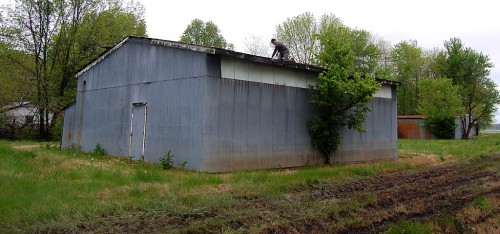 Mark climbed up on the roof to replace some tin that had been ripped off in the recent storms. I stayed on the ground to call for help if he fell off. Robin stayed in the car to call for help in case he fell on top of me.
Mark climbed up on the roof to replace some tin that had been ripped off in the recent storms. I stayed on the ground to call for help if he fell off. Robin stayed in the car to call for help in case he fell on top of me.
We let a farmer who sharecrops with us store some of his equipment in our storage buildings. He passed by the Diversion Channel this morning and saw that it had come up amazingly fast and decided he had better move the equipment before it was too late. Based on how soggy the ground had become, it looks like he made a wise choice. We must have arrived just after he pulled out.
Cape LaCroix Creek merges
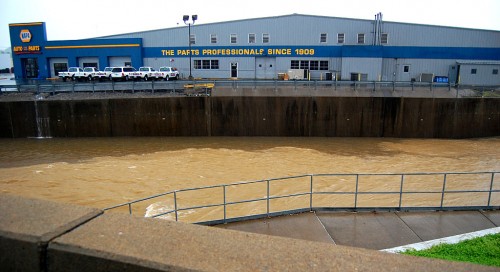 Cape LaCroix Creek, which drains much of northwestern Cape and eventually empties into the Mississippi River, joins the smaller drainage channel between Bloomfield Rd. and Good Hope. The lighter, more muddy-looking water is from Cape LaCroix.
Cape LaCroix Creek, which drains much of northwestern Cape and eventually empties into the Mississippi River, joins the smaller drainage channel between Bloomfield Rd. and Good Hope. The lighter, more muddy-looking water is from Cape LaCroix.
Cape LaCroix goes under Kingshighway
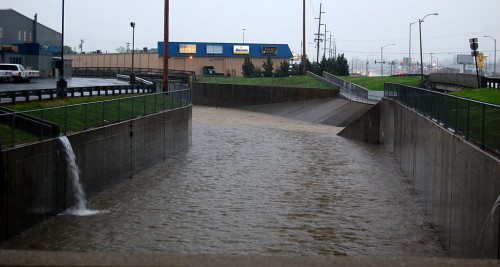 Here’s a view looking south at the merger of the two channels. Cape LaCroix comes in from the right.
Here’s a view looking south at the merger of the two channels. Cape LaCroix comes in from the right.
Looking south toward Themis
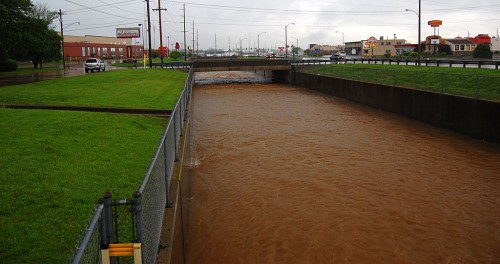 Looking north toward Bessie Street
Looking north toward Bessie Street
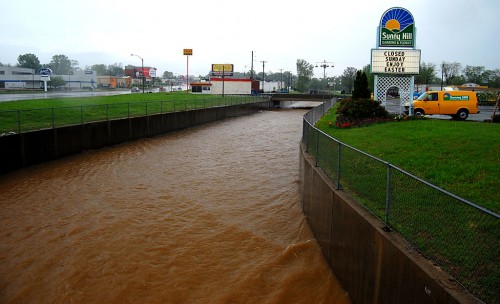 Water from Old Central High
Water from Old Central High
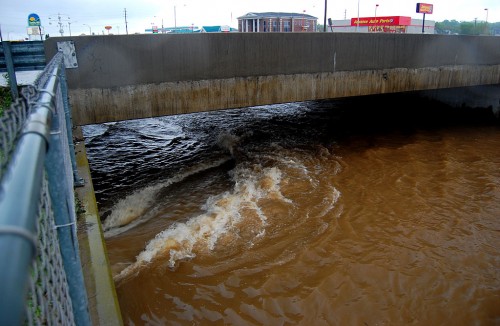 Water from the neighborhoods around old Central High School feeds in at Bessie Street
Water from the neighborhoods around old Central High School feeds in at Bessie Street
Pavement causes rapid runoff
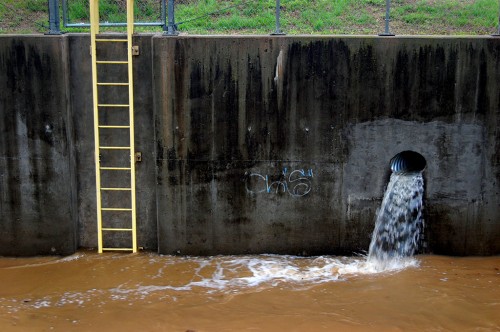 Acres and acres of parking lots and driveways cause rainwater to run off quickly. This pipe is just south of old Kingsway Drive.
Acres and acres of parking lots and driveways cause rainwater to run off quickly. This pipe is just south of old Kingsway Drive.
Cement canal starts north of Broadway
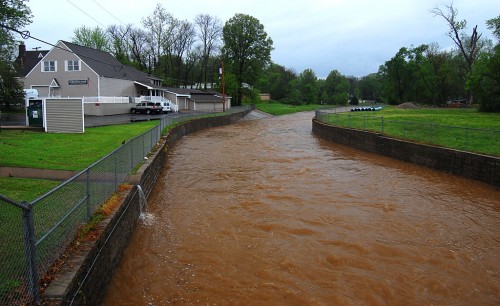 The cement portion of the project starts just north of Old Kingsway Dr., which is now a dead end road.
The cement portion of the project starts just north of Old Kingsway Dr., which is now a dead end road.
Broadway bridge
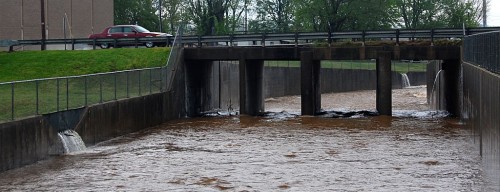 This is the bridge at Broadway and Kingshighway. Notice how many streams of water join the canal.
This is the bridge at Broadway and Kingshighway. Notice how many streams of water join the canal.
Dennis Scivally Park
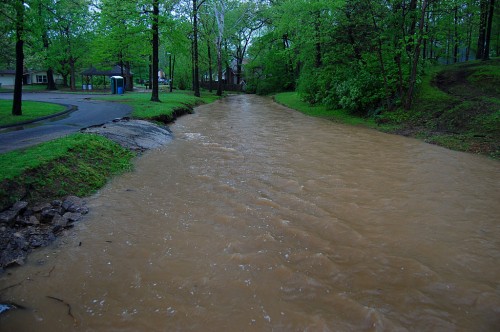 This water originates in the neighborhoods north of Dennis Scivally Park.
This water originates in the neighborhoods north of Dennis Scivally Park.
Dennis Scivally Park bridge
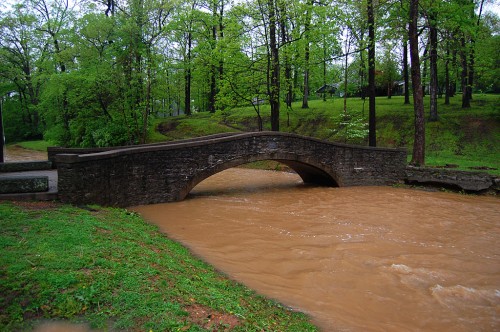 Look how much more water there was Sunday than when I shot the bridge last week.
Look how much more water there was Sunday than when I shot the bridge last week.
Splashing over Cape Rock Dr. bridge
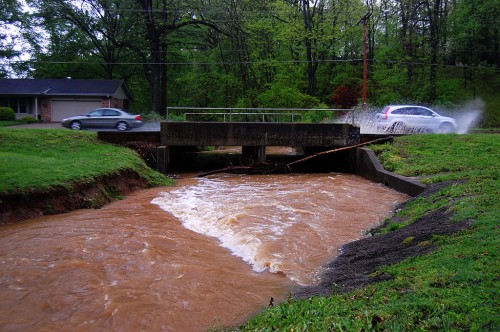 Ponded water on the Cape Rock Drive bridge sent huge curtains of water skyward when hit by passing cars.
Ponded water on the Cape Rock Drive bridge sent huge curtains of water skyward when hit by passing cars.
Cape LaCroix Creek at N. Kingshighway
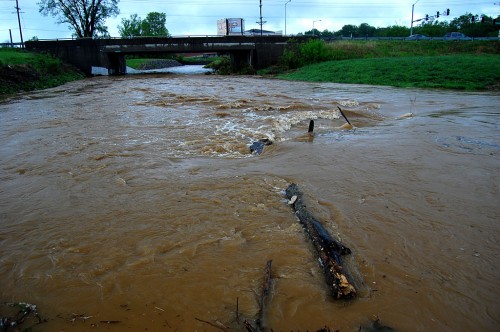 Cape LaCroix Creek boils under Kingshighway just down from Kingsway Dr. on the northwest part of town. The mini-rapid is caused by water crossing over a concrete bridge used to reach the north extension of the bike path.
Cape LaCroix Creek boils under Kingshighway just down from Kingsway Dr. on the northwest part of town. The mini-rapid is caused by water crossing over a concrete bridge used to reach the north extension of the bike path.
Bike path underwater
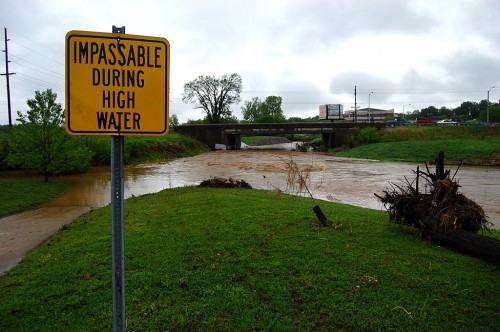 “Impassable during high water” is an understatement. The bike path runs next to the bridge on the left. It’s probably under about three or four feet of fast-moving water.
“Impassable during high water” is an understatement. The bike path runs next to the bridge on the left. It’s probably under about three or four feet of fast-moving water.
Headed back home
I’m leaving Cape Monday to make it back to West Palm Beach by mid-week, so I’m going to miss the big flooding. On the other hand, I’m not sorry to put all these rain in the rearview mirror. This is getting old.
I have some good video, including vintage photos of the Town Plaza flooding in the 80s to edit when I get back home. I ran out of time to do it here.
If things are a little slow here for a couple of days, it’s because I’ve run into one too many puddles or that I’m trying to make miles.

Wow, good documentation of the storm water system in Cape, Ken! I’ve gotten trapped in the city a few timed in a downpour, and I didn’t think I’d be able to get out. I remember a particularly harrowing trip with two little girls, going to a gymnastic practice on the Semo campus.
All the intersections on the way out of town were full of water and stalled cars. I mentally measured the clearance on my Jeep, sitting and watching other cars go through the deep water.
Never so glad to get out of town! Must be how you feel right now. Escape while you can!
Johnny Cash made it sound better than it actually is. But then, he never had a huge water tank float around his property like a butterfly going from flower to flower.
…”How high’s the water, Mama?
Three feet high and risin’
How high’s the water, Papa?
She said, “It’s three feet high and risin'”
Well, the hives are gone, I’ve lost my bees
The chickens are sleepin’ in the willow trees
Cow’s in water up past her knees
Three feet high and risin’…
Yes, I remember when it rained when we lived on the Town Plaza property. Our house, Dad veterinary Hospital, the barn and 1 hill where the ponies stood was all that was above water for several days. We couldn’t make it out to the highway that was scary. Thanks for the pictures, I really enjoy your articles.
Here is what used to happen on Kingshighway before the flood control system:
http://www.semissourian.com/blogs/flynch/entry/35824
Fred,
Thanks for sharing. I’m usually the one following your posts.
For those who don’t recognize the name, Fred is a long-time Missourian photographer who does a blog of old Frony pictures, similar to what I do here. He came TO Cape about the time I was running AWAY from Cape.
If you like my stuff, shuffle through his archives.
Did Frony document the construction of the West Side flood control project as well as he did the flood wall? What was the total cost of the former, and how much of it did the local merchants pay as compared to the tax dollars pumped into it?
Andy, the former would be a question for Fred Lynch. He’ll probably weigh in.
As far as the second question, I don’t have any idea. I’m just about ready to unplug everything and load it in the car to head back to FL, so somebody else will have to step up to the plate.
Ken, it is hot and very dry here in sunny south FL but you can leave the rain there. Those pictures of the flooding canals could have been FL after a hurricane but there would be alligators in the photos.
Those alligators would be paddling like crazy. Unlike S. Fla, MO waters crank because there are hills that cause rapid runoff.
On top of that, the ground is so saturated that every drop that falls runs off.
It was a real shock to wake up in WPB this morning and see a dry, brown lawn (mostly sand) and feel the heat.
Ken, I have surely enjoyed your visit to Cape this past week or so. You have given us some great pictures to look at and stories to read. Everyday, I cant wait to get your email and see what pictures you have to share.
Keep up the GREAT work………….!!!!
I see that Cape Girardeau has a lot more green than we do in southwest Michigan. It also has a lot more reddish-brown.
If this rain ever lets up, there’s going to be some serious mowing going on. All of the water has caused lawns and trees to green up.
BTW, I found out how the scary plants have survived in a closed-up building all this time.
I drove by the Plaza Galleria while I was shooting the high water pix.
It was raining almost as hard IN the building as outside it.
Thanks for the pictures. I have been house bound for over a week with a near death upper respiratory and bronchial thing and missed all of this. Guess I picked a good sick time if there is such a thing. Have a safe trip home and will be anxiously awaiting more history and pictures from you. It is a good feeling to be appreciated…..so hope you are feeling it!!
I grew up in Chaffee and spent plenty of time in Cape, too. Thanks for the great pictures and articles you give us, I really, really enjoy them. One of my flood memories was of a big snake crawling up the side of this house trying to get out of the boiling flood waters.
In reply to Andy Juden’s comment above, no, Frony did not document the flood control project. He retired in 1986.
This story in the Southeast Missourian from April 20, 2004, page 3, reports the completion of the 11-year project:
http://news.google.com/newspapers?nid=Oc-rVwKPngoC&dat=20040420&printsec=frontpage&hl=en
In the story, it is reported the $40 million project was largely completed in the fall of 2002. The federal government funded 75 percent of the cost. Passage of a quarter-cent capital improvement sales tax in 1988 funded the local share of the project and the remainder of the cost.
Ken, we need you back here as I have my own blog to do!
As compared to $4 million for the flood wall paid for by the Downtown Merchants.
“Toad Choker”!
Dennis Scivally park looks quite different from the pics you posted on April 12, 2011. What a difference a few weeks of rain makes. And sadly – more to come.
Cape LaCroix “creek” at Kings highway looks more like a river than a creek but from looking at your pictures, it looks like overall, they have done a pretty good job with their flood control system in Cape.
Joe Whitright “45”
I learned my lesson about high water on the bridge at Lombardo Dr one night back in the late 70s or early 80s. Did not seem that deep when I started but by the time I got halfway the front of my VW bug was floating. Way way too close.
Great job on the flood control system story and pictures. May you have a safe, DRY journey back to SUNNY Florida. I hope you won’t have to use your windshield wipers for weeks!!!!
I remember seeing a photo from the ’80 flood of someone in a row boat rowing past the Water St. street sign. I wasn’t living in Cape at the time, so I’m guessing I saw it in picked up in another paper, maybe while I was visiting my sister in Branson.
Ken i live in one of the highest point in cape
on marietta st, off perryville road.
I am not safe from the flood my down stairs garage is
getting water comming up thu the floor and wall.
Mitch
When we first moved into our house on Kingsway in the 50s, I remember a number of cracks in the basement that would leak.
Dad bought some kind of blue stuff that we kept painting over the cracks until, finally, we got them all stopped.
If this series of rains didn’t cause them to leak (knock wood), then nothing will.
living in the desert i forget what real water looks like. we only have 15days of rain per year, in a good year, and our rivers are dry beds and washes. nice pics ken, our 2% humidity was washed away by your photos. thanks.
I remember one particular flash flood in the Town Plaza in late March of 1977 – my brother, Bruce, was a manager of the Woolworth in there. In that flood, I believe there was a car dealership (Volkswagon if I recall correctly) at the SE corner of William and Kingshighway, and a number of those cars floated down Kingshighway. Bruce had gone to the store to lift things to higher shelves
whoever posted the messages under the name Andy Juden
was not Andy Juden. He does not do social mail and he already knew the answer to the questions posted.
The answers were not correct either.The downtown merchants did not pay a dime for the construction of the flood wall unless they were also the owners of the property. The property owners were the ones who paid their money to construct the wall along with the government.The tax that was afterwards agreed to by, again, the property owners was for upkeep of the pumping stations and the borders of the wall and any other costs that came along such as the salary for the men who had to man the station during floods.
Thanks for clearing that up.